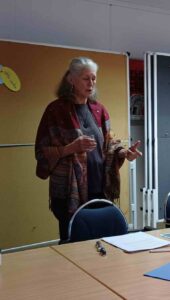January 16, 2023: The German Women’s Network for Peace organized a discussion on the Dr. Martin Luther King Jr. holiday in the U.S. “US-American activist Anna Gyorgy gave some thoughts on democracy in the U.S. today and struggles against what Dr. King named “the giant triplets of racism, materialism, and militarism.”
Here is the English version of the opening presentation given in German, which was followed by a lively discussion.

Presentation by Anna Gyorgy, January 16, 2023
It is an honor to meet with you today, to talk about the legacy of Dr. Martin Luther King Jr. and to hear your comments and thoughts on the urgent matters that face us all.
This is the official American holiday honoring his birth on January 15, 1929. Today he would be 94 years old. Yet he was killed by an assassin’s bullet when only 39.
Here’s a brief identification of this great leader, from the online Wikipedia:
“Martin Luther King Jr. was an American Baptist minister and activist, one of the most prominent leaders in the civil rights movement from 1955 until his assassination in 1968. An African American church leader and son of early civil rights activist and minister Martin Luther King Sr., King advanced civil rights for people of color in the United States through nonviolence and civil disobedience.”
He accomplished and put in motion so much during his brief 39 years on earth. He inspired millions through his brilliant speeches and nonviolent civil disobedience actions in the Gandhian tradition. He believed in the creation of what he called “the beloved community.”
Quoting from an essay about this:
“Dr. Martin Luther King, Jr. spoke often of beloved community as a way of transforming people and relationships and creating communities grounded in reconciliation, friendship and human dignity. Key principles include nonviolence as powerful expressions of courage, understanding, trust and love.
Although he is the most recognized leader of the civil rights era, many dedicated activists were involved in this dynamic and often dangerous movement. It revealed both the depths of racism in the United States and set in motion some basic changes through civil and voting rights legislation. (Full text here)